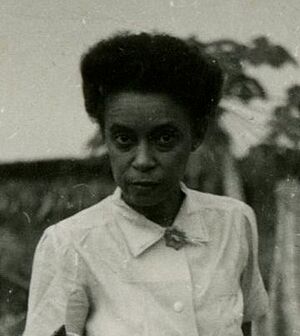Suzanne Comhaire-Sylvain facts for kids
Quick facts for kids
Suzanne Comhaire-Sylvain
|
|
|---|---|

Suzanne Comhaire-Sylvain
|
|
| Born | November 6, 1898 Port-au-Prince, Haiti |
| Died | June 20, 1975 (aged 76) Nigeria |
| Occupation | Folklorist, anthropologist, ethnographer |
| Period | c. 1935–1975 |
| Spouse |
Jean Comhaire
(m. 1927; div. 1975) |
Suzanne Comhaire-Sylvain (born November 6, 1898 – died June 20, 1975) was a very important Haitian scholar. She was the first woman from Haiti to become an anthropologist. Anthropologists study human societies and cultures.
Suzanne Comhaire-Sylvain studied with famous professors like Bronisław Malinowski. She also worked with Alfred Métraux on a special project for UNESCO in Haiti. She married Jean Comhaire, who was also an anthropologist. Later, she worked in Africa.
Contents
Biography
Early Life and Education
Suzanne Comhaire-Sylvain was born in Port-au-Prince, Haiti, on November 6, 1898. Her father, Georges Sylvain, was a well-known Haitian activist. He was a symbol of resistance against the American occupation of Haiti. Her mother was Eugénie Malbranche.
Suzanne studied in Kingston and Port-au-Prince. She then earned her bachelor's and doctorate degrees in Paris, France. She was very interested in Haitian folklore, which includes traditional stories and beliefs. She also cared about the social issues affecting women in Haiti and Africa.
Research on Haitian Creole
One of her main research areas was the origins of the Creole language. At that time, many people thought Creole was not a serious language. It was often seen as childish or not valuable. Suzanne chose a difficult path by studying it.
Even though some people didn't take her work seriously, a famous Polish anthropologist named Bronisław Malinowski became interested. He invited her to London. There, she became his research assistant. She also studied at London University and the London School of Economics. She did important research at the British Museum. This work led to her main book about the African roots of Haitian Creole.
Fieldwork and Global Contributions
Comhaire-Sylvain traveled a lot for her research. She did fieldwork in places like Kenscoff and Marbial in Haiti. She also worked in Kinshasa (Congo), Lomé (Togo), and Nsukka (Nigeria). She worked with other famous anthropologists like Melville Herskovits and Alfred Métraux.
Métraux even asked her and her husband, Jean Comhaire, to lead a UNESCO project in Haiti. Suzanne also taught at the New School for Social Research in New York. She received a special award called a Guggenheim fellowship. She was also chosen to be a member of the United Nations council for Togo and Cameroon. This council helped these countries as they moved towards independence.
A Notable Family
Suzanne Comhaire-Sylvain came from a very important family in Haiti. Her uncle, Benito Sylvain, was one of the people who started the idea of Pan-Africanism. This movement aimed to unite people of African descent around the world. Her father, Georges Sylvain, was a key figure in the fight against the American occupation of Haiti.
Suzanne was the oldest of seven children. Her sister, Yvonne Sylvain (1907–1989), was the first Haitian woman doctor. She was also the country's first gynecologist-obstetrician. Yvonne wrote many articles for a magazine called Voix des femmes (Women's Voices).
Their brother, Normil Sylvain (1900–1929), was a poet. He helped start a magazine called La Revue indigène in 1927. Another sister, Madeleine Sylvain (1905–1970), helped create the Ligue Feminine d’Action Sociale (Feminine League for Social Action). This group worked to get equal legal rights for women, especially married women.
Finally, her youngest brother, Pierre Sylvain (1910–1991), was a botanist. He studied plants and wrote reports about how coffee is grown in Ethiopia.
Later Life and Legacy
Suzanne Comhaire-Sylvain died in a car accident in Nigeria on June 20, 1975. Her important papers and research notes have been organized and are available at Stanford University Libraries. This means future students and researchers can learn from her work.
Selected Published Works
Suzanne Comhaire-Sylvain's work was highly recognized. She wrote over 200 articles and books. She received many awards, including the "Prix de l'Alliance Française" (The French Alliance Prize) and "La Médaille de l'Académie Française" (The Medal of the French Academy).
Her writings covered many topics. She wrote about Haitian folktales, the Creole language, and the lives of women in different parts of Africa. Some of her notable works include:
- 1937. Les contes haiïtiens (Haitian Tales)
- 1938. Contes du pays d'Haïti (Tales from the Land of Haiti)
- 1968. Femmes de Kinshasa hier et aujourd'hui (Women of Kinshasa Yesterday and Today)
- 1974. Jetons nos couteaux!: contes des garçonnets de Kinshasa et quelques parallèles haïtiens (Let's Throw Our Knives!: Tales from the Boys of Kinshasa and Some Haitian Parallels)
- 1982. Femmes de Lomé (Women of Lomé)
See also
 | Calvin Brent |
 | Walter T. Bailey |
 | Martha Cassell Thompson |
 | Alberta Jeannette Cassell |

